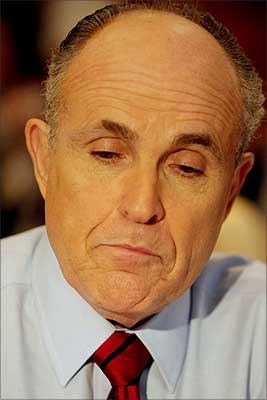 Today, former New York City mayor Rudy Giuliani is expected to end what has become an increasingly irrelevant candidacy and announce his support for US Senator John McCain. This follows Giuliani's disappointing third place finish in the January 29 Florida Republican primary, the contest on which he had staked his presidential chances.
Today, former New York City mayor Rudy Giuliani is expected to end what has become an increasingly irrelevant candidacy and announce his support for US Senator John McCain. This follows Giuliani's disappointing third place finish in the January 29 Florida Republican primary, the contest on which he had staked his presidential chances.
Back in February 2007, amidst great fanfare and media attention, Giuliani announced his candidacy for the Republican nomination.
Early polls placed him as the clear favourite, and he enjoyed commanding leads in delegate-rich states like California, New York, New Jersey and Florida. In short, he seemed a virtual lock for the Republican nomination, provided his campaign could avoid self-destruction.
What a difference a year makes.
Today, exactly one year after Giuliani threw his hat in the ring, seven states have held Republican primaries/conventions/caucuses; Giuliani's best finish was a distant third in Florida. He finished fourth in New Hampshire, sixth in Iowa, South Carolina, Nevada and Michigan, and an embarrassing seventh in Wyoming.
Yet, at one point last July, polls showed him leading or a close second in all seven states.
The question begs: What happened?
Simply put, as future political scientists and campaign strategists will undoubtedly remind us, Giuliani's campaign fell to pieces. The wheels came off the wagon. Cue the other cliches.
When Giuliani's candidacy was announced, Republicans rejoiced. They had found someone whom most conservatives and many moderates could agree on. He was pro-life, but not fanatically. He appealed to the religious right, but was not overtly so himself. He was pro-business and pro-growth, but not at the expense of average American. He wasn't stridently critical of current President George W Bush and had always supported the war in Iraq and a strong military.
He was the perfect candidate.
And, on top of everything else, he was championed as the man who saved New York City from first itself, by working to eliminate crime, drugs and public nudity masquerading as art, and later outsiders, in the form of terrorists. If the man could single-handedly resurrect America's greatest city, supporters said, imagine the beneficial effect he'd have on America herself!
But the first fissures showed in the autumn months of 2007, when sticky marital problems from the past were dredged up by opponents. Giuliani -- who has been married three times, two of which ended in acrimonious divorce -- was painted as a deadbeat dad, estranged from his son and daughter, and not a significant part of their lives. Polls began hinting at a decline in popular support.
Moreover, some reports in the media accused Giuliani of billing New York City agencies tens of thousands of dollars so that he could hide expenses incurred during his secret trysts with Judith Nathan, with whom he was having an extramarital affair while still serving as mayor of New York City.
Then, a full-blown breach occurred in November and December, when Giuliani's ties to Bernard Kerick, who had been indicted on 16 counts of tax fraud and other federal charges, fell under the microscope. Giuliani had recommended Kerick for secretary of homeland security to George W Bush in 2004, and Kerick had also served as the police commissioner of New York City while Giuliani was mayor.
It was then that the truly precipitous decline began, one which saw him move from a nearly two to one advantage over his nearest opponent to a distant afterthought today, lapped by McCain, Mitt Romney, Ron Paul and Mike Huckabee.
But back then, in November, the Giuliani campaign formulated a plan to stop the blood-letting in the polls: They would concentrate exclusively on bagging delegate-heavy states late in primary season, beginning with Florida, and ride that momentum to the Republican national convention in September.
So, as other candidates fought grassroots battles in Iowa and New Hampshire, Giuliani focused his attention, as well as his sizable campaign budget, on Florida.
Immediately, political strategists viewed the move as dubious, and questioned the rationale.
When Huckabee and Barack Obama took Iowa for the Republicans and Democrats respectively, the media went bonkers.
There were stories about Obama versus Clinton, Huckabee as the Evangelical Christian, Obama as the first African-American president, the importance of New Hampshire, Hillary's campaign problems, etc.
Unfortunately for Giuliani, he was no longer the 'it' news item. A languishing sixth place finish pushed him off the front page and out of prime-time news coverage. He had lost his buzz.
And while his team geared up for Florida, and after that, Super Tuesday, the campaign continued to lose momentum. He polled in the single digits in the first six states, and by mid-January it was clear that only a clean sweep of Florida, New York, New Jersey and California could save him.
But yesterday, McCain continued his winning ways, and put distance between himself and his next closest competitor, business tycoon Romney. Giuliani experienced his best finish yet -- third place and 15 per cent of the vote -- pitiful numbers for a man who once held the lion's share of his party's support.
And with that, it was over.
The lights were turned out and the candidacy put to bed of a man who once ruled the city that doesn't sleep.
Text: Matthew Schneeberger. Photograph: Joe Raedle/Getty Images






 © 2025
© 2025